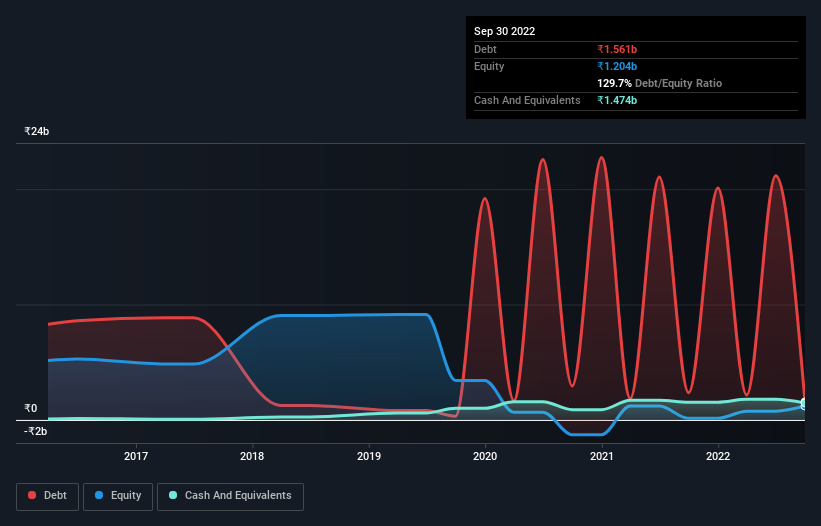- India
- /
- General Merchandise and Department Stores
- /
- NSEI:SHOPERSTOP
Shoppers Stop (NSE:SHOPERSTOP) Has A Pretty Healthy Balance Sheet
The external fund manager backed by Berkshire Hathaway's Charlie Munger, Li Lu, makes no bones about it when he says 'The biggest investment risk is not the volatility of prices, but whether you will suffer a permanent loss of capital.' So it seems the smart money knows that debt - which is usually involved in bankruptcies - is a very important factor, when you assess how risky a company is. We note that Shoppers Stop Limited (NSE:SHOPERSTOP) does have debt on its balance sheet. But the real question is whether this debt is making the company risky.
When Is Debt A Problem?
Debt and other liabilities become risky for a business when it cannot easily fulfill those obligations, either with free cash flow or by raising capital at an attractive price. Part and parcel of capitalism is the process of 'creative destruction' where failed businesses are mercilessly liquidated by their bankers. However, a more frequent (but still costly) occurrence is where a company must issue shares at bargain-basement prices, permanently diluting shareholders, just to shore up its balance sheet. Of course, debt can be an important tool in businesses, particularly capital heavy businesses. The first step when considering a company's debt levels is to consider its cash and debt together.
Check out our latest analysis for Shoppers Stop
What Is Shoppers Stop's Net Debt?
You can click the graphic below for the historical numbers, but it shows that Shoppers Stop had ₹1.56b of debt in September 2022, down from ₹2.36b, one year before. However, it does have ₹1.47b in cash offsetting this, leading to net debt of about ₹86.6m.

How Healthy Is Shoppers Stop's Balance Sheet?
According to the last reported balance sheet, Shoppers Stop had liabilities of ₹23.4b due within 12 months, and liabilities of ₹17.6b due beyond 12 months. Offsetting these obligations, it had cash of ₹1.47b as well as receivables valued at ₹465.9m due within 12 months. So its liabilities total ₹39.1b more than the combination of its cash and short-term receivables.
Shoppers Stop has a market capitalization of ₹77.8b, so it could very likely raise cash to ameliorate its balance sheet, if the need arose. But we definitely want to keep our eyes open to indications that its debt is bringing too much risk. Carrying virtually no net debt, Shoppers Stop has a very light debt load indeed.
We use two main ratios to inform us about debt levels relative to earnings. The first is net debt divided by earnings before interest, tax, depreciation, and amortization (EBITDA), while the second is how many times its earnings before interest and tax (EBIT) covers its interest expense (or its interest cover, for short). This way, we consider both the absolute quantum of the debt, as well as the interest rates paid on it.
Shoppers Stop has a net debt to EBITDA ratio of 0.025, suggesting a very conservative balance sheet. But EBIT was only 1.3 times the interest expense last year, which shows that the debt has negatively impacted the business, by constraining its options (and restricting its free cash flow). We also note that Shoppers Stop improved its EBIT from a last year's loss to a positive ₹2.5b. When analysing debt levels, the balance sheet is the obvious place to start. But ultimately the future profitability of the business will decide if Shoppers Stop can strengthen its balance sheet over time. So if you're focused on the future you can check out this free report showing analyst profit forecasts.
Finally, a company can only pay off debt with cold hard cash, not accounting profits. So it's worth checking how much of the earnings before interest and tax (EBIT) is backed by free cash flow. Over the last year, Shoppers Stop actually produced more free cash flow than EBIT. There's nothing better than incoming cash when it comes to staying in your lenders' good graces.
Our View
Both Shoppers Stop's ability to to convert EBIT to free cash flow and its net debt to EBITDA gave us comfort that it can handle its debt. But truth be told its interest cover had us nibbling our nails. Considering this range of data points, we think Shoppers Stop is in a good position to manage its debt levels. Having said that, the load is sufficiently heavy that we would recommend any shareholders keep a close eye on it. The balance sheet is clearly the area to focus on when you are analysing debt. But ultimately, every company can contain risks that exist outside of the balance sheet. Case in point: We've spotted 2 warning signs for Shoppers Stop you should be aware of.
If, after all that, you're more interested in a fast growing company with a rock-solid balance sheet, then check out our list of net cash growth stocks without delay.
New: Manage All Your Stock Portfolios in One Place
We've created the ultimate portfolio companion for stock investors, and it's free.
• Connect an unlimited number of Portfolios and see your total in one currency
• Be alerted to new Warning Signs or Risks via email or mobile
• Track the Fair Value of your stocks
Have feedback on this article? Concerned about the content? Get in touch with us directly. Alternatively, email editorial-team (at) simplywallst.com.
This article by Simply Wall St is general in nature. We provide commentary based on historical data and analyst forecasts only using an unbiased methodology and our articles are not intended to be financial advice. It does not constitute a recommendation to buy or sell any stock, and does not take account of your objectives, or your financial situation. We aim to bring you long-term focused analysis driven by fundamental data. Note that our analysis may not factor in the latest price-sensitive company announcements or qualitative material. Simply Wall St has no position in any stocks mentioned.
About NSEI:SHOPERSTOP
Shoppers Stop
Engages in the retail of various household and consumer products through retail and departmental stores in India.
Fair value with moderate growth potential.
Similar Companies
Market Insights
Community Narratives


Recently Updated Narratives


The Quiet Giant That Became AI’s Power Grid


Nova Ljubljanska Banka d.d will expect a 11.2% revenue boost driving future growth


The AI Infrastructure Giant Grows Into Its Valuation
Popular Narratives


The company that turned a verb into a global necessity and basically runs the modern internet, digital ads, smartphones, maps, and AI.


MicroVision will explode future revenue by 380.37% with a vision towards success



